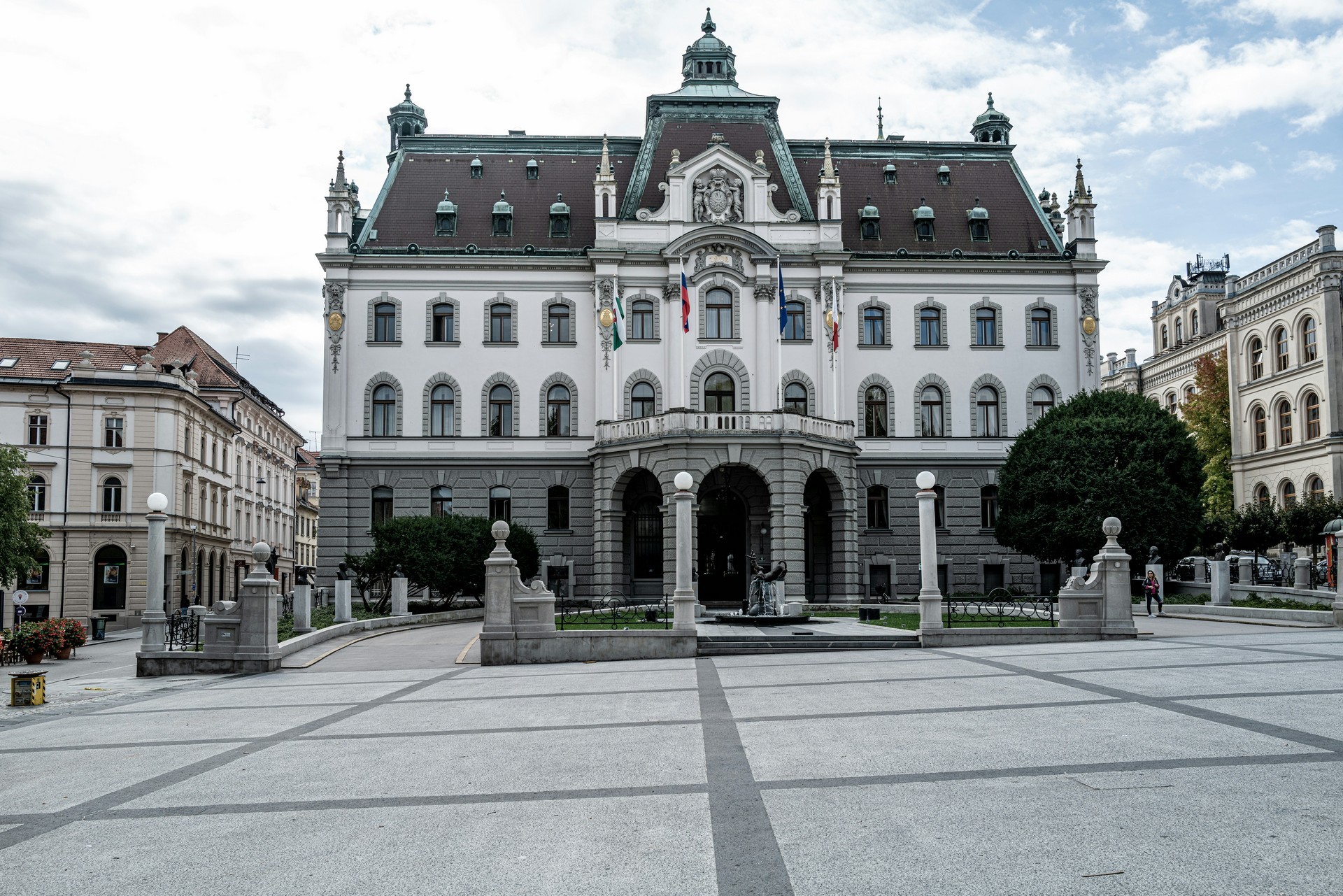Slovenia

29
Universities

200+
Courses

EUR
Currency

About Slovenia
Slovenia, nestled in the heart of Europe, is a country of stunning natural beauty and rich cultural heritage. From the picturesque Lake Bled with its island church to the vibrant capital city of Ljubljana, Slovenia offers a diverse range of experiences for visitors and residents alike. Its compact size makes it easy to explore, with medieval towns, rolling vineyards, and pristine alpine landscapes all within reach. Slovenian cuisine, influenced by its neighbors but with its own unique twist, delights with dishes like potica (a traditional nut roll) and delicious local wines.
Studying in Slovenia presents a compelling option for international students seeking high- quality education in a welcoming environment. Slovenian universities, such as the University of Ljubljana and the University of Maribor, are well-regarded for their academic excellence and research opportunities across various disciplines. Many programs are offered in English, making them accessible to students from around the world. Additionally, Slovenia's commitment to innovation and sustainability is reflected in its educational institutions, which often collaborate with industry and participate in international research projects.
For those considering higher education in Slovenia, the country's universities provide not only rigorous academic training but also a chance to immerse oneself in a culturally rich and diverse environment. Beyond the classroom, students can explore Slovenia's vibrant arts scene, outdoor activities like hiking and skiing, and its thriving café culture. The cost of living in Slovenia is relatively affordable compared to other European countries, adding to its appeal for students looking to experience Europe without breaking the bank. Whether drawn by the prospect of studying in a stunning natural setting or by the academic reputation of its universities, Slovenia offers a unique and enriching educational experience.
Why Study in Slovenia?
- Quality Education Standards
- Affordable Tuition and Living Costs
- Central Location in Europe
- Exceptional Safety Record
- Diverse Multicultural Environment
- Extensive English-Taught Programs
- Rich Cultural Heritage and Exploration
- Stunning Natural Landscapes
- Active in Innovation and Research
- Warm and Welcoming Hospitality
Top Universities in Slovenia
- University of Ljubljana
- University of Maribor
- University of Primorska
- University of Nova Gorica
- University of Applied Sciences Velika Gorica
- University of Nova Gorica
- University of Koper
Top Courses in Slovenia
- Business Administration
- Computer Science
- Medicine
- Engineering (Mechanical, Civil, Electrical, etc.)
- Environmental Sciences
- Tourism and Hospitality Management
- Arts and Design
- International Relations and Political Science
- Agriculture and Forestry
- Linguistics
Admission Requirements
- Academic Qualifications
- Language Proficiency (if applicable)
- Application Form
- Transcript of Records
- Letters of Recommendation
- Statement of Purpose or Motivation Letter
- CV or Resume
- Passport Copy
- Proof of Funds (for visa purposes)
- Application Fee (if applicable)
Scholarships
- Slovenian Government Scholarships
- Erasmus+ Scholarships
- CEEPUS Scholarships
- Ad Futura Scholarships
- Public Scholarship, Development, Disability and Maintenance Fund of the Republic of Slovenia (Štipendiranje) Scholarships
- CEEPUS Network Scholarships
- EMUNI Scholarships
- Visegrad Fund Scholarships
- European Master's Scholarship Programme in Embedded Computing Systems (EMCSE)
- Faculty-specific scholarships
Slovenia: Industry & Economic Outlook
Slovenia's economy is characterized by a high level of openness and a strong industrial base, with key sectors including automotive manufacturing, pharmaceuticals, electronics, and tourism. In recent years, Slovenia has shown steady economic growth, with a GDP growth rate of 4.4% in 2021. The country benefits from its strategic location in Central Europe, robust infrastructure, and a skilled workforce. However, challenges such as aging demographics and global economic uncertainties pose ongoing concerns for its economic outlook.
In Demand Job Sectors
- Information Technology (IT)
- Engineering (Mechanical, Civil, Electrical, etc.)
- Healthcare (Doctors, Nurses, Healthcare Administrators)
- Finance and Accounting
- Tourism and Hospitality
- Education and Teaching
- Manufacturing and Automotive
- Environmental Sciences
- Business Administration and Management
- Marketing and Digital Marketing
Skill Shortages
- Information Technology (IT)
- Engineering (Mechanical, Civil, Electrical, etc.)
- Healthcare Professionals (Doctors, Nurses)
- Finance and Accounting
- Construction and Building Trades
- Education (Teachers, Lecturers)
- Hospitality and Tourism
- Manufacturing and Production
- Sales and Marketing
- Environmental Sciences
Part time Careers & Work Opportunities
- Retail
- Hospitality (Restaurants, Cafes)
- Tutoring
- Administrative Assistant
- Event Staff
- Research Assistant
- Customer Service
- Language Teaching
- Freelance Writing or Translation
- IT Support
Our Process
- Initial Assessment
- Research & Recommendations
- Application Assistance
- Test Preparation
- Visa Guidance
- Financial Planning
- Pre-departure support
- Ongoing support
- Follow-ups
FAQ’s
There are typically two types of visas students can apply for: a short-stay visa (up to 90 days) or a long-stay visa (over 90 days). For longer stays, students usually apply for a residence permit.
Visa requirements often include proof of enrollment in a recognized Slovenian educational institution, sufficient funds to cover living expenses, valid health insurance, and a clean criminal record. Additional documents such as a passport, passport-sized photos, and application forms are also required.
Processing times for student visas can vary, but it typically takes several weeks to a few months from the date of application submission. It's advisable to apply well in advance to allow for sufficient processing time.
Student life in Slovenia is vibrant and diverse. Universities offer a wide range of activities and clubs, and the country itself provides opportunities for outdoor activities and cultural exploration. The cost of living is moderate, and the locals are known for their friendliness and hospitality, making it a welcoming environment for international students.
Quick Facts
Capital
Ljubljana
Population
2,119,000
Language
Slovenian
International students
9,426
GDP
$88 billion
Dialing Code
+386
Cost of Living
€2,715.6
Scholarship
YES
Migration Possibility
YES
Tuition fees
2,000 to 11,000 EUR
Average graduate incomes
€23,305 per year
Intakes
September and February
